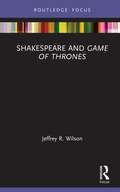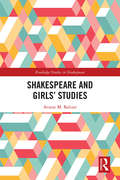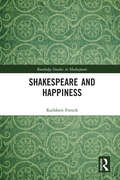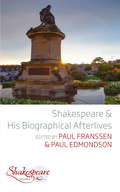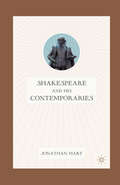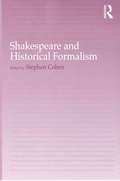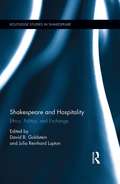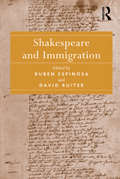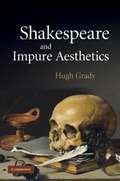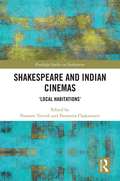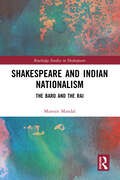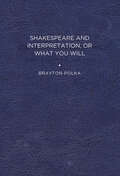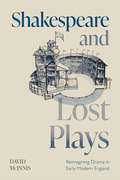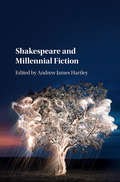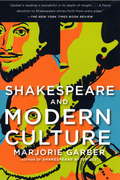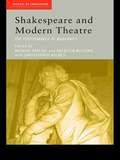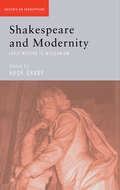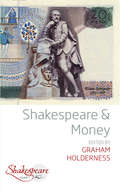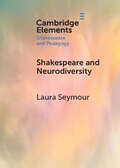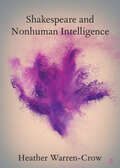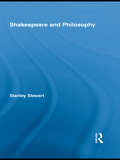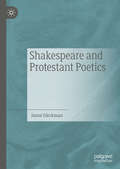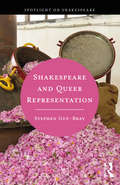- Table View
- List View
Shakespeare and Game of Thrones
by Jeffrey R. WilsonIt is widely acknowledged that the hit franchise Game of Thrones is based on the Wars of the Roses, a bloody fifteenth-century civil war between feuding English families. In this book, Jeffrey R. Wilson shows how that connection was mediated by Shakespeare, and how a knowledge of the Shakespearean context enriches our understanding of the literary elements of Game of Thrones. On the one hand, Shakespeare influenced Game of Thrones indirectly because his history plays significantly shaped the way the Wars of the Roses are now remembered, including the modern histories and historical fictions George R.R. Martin drew upon. On the other, Game of Thrones also responds to Shakespeare’s first tetralogy directly by adapting several of its literary strategies (such as shifting perspectives, mixed genres, and metatheater) and tropes (including the stigmatized protagonist and the prince who was promised). Presenting new interviews with the Game of Thrones cast, and comparing contextual circumstances of composition—such as collaborative authorship and political currents—this book also lodges a series of provocations about writing and acting for the stage in the Elizabethan age and for the screen in the twenty-first century. An essential read for fans of the franchise, as well as students and academics looking at Shakespeare and Renaissance literature in the context of modern media.
Shakespeare and Genre
by Anthony R. GuneratneProvides a comprehensive survey of approaches to genre in Shakespeare's work. Contributors probe deeply into genre theory and genre history by relating Renaissance conceptions. In this sense, the volume proposes to read Shakespeare through genre and, just as importantly, read genre through Shakespeare.
Shakespeare and Girls’ Studies (Routledge Studies in Shakespeare)
by Ariane M. BalizetA modern-day Taming of the Shrew that concludes at a high school prom. An agoraphobic Olivia from Twelfth Night sending video dispatches from her bedroom. A time-traveling teenager finding romance in the house of Capulet. Shakespeare and Girls’ Studies posits that Shakespeare in popular culture is increasingly becoming the domain of the adolescent girl, and engages the interdisciplinary field of Girls’ Studies to analyze adaptation and appropriation of Shakespeare’s plays in the late 20th and early 21st centuries. Through chapters on film, television, young adult fiction, and web series aimed at girl readers and audiences, this volume explores the impact of girl cultures and concerns on Shakespeare’s afterlife in popular culture and the classroom. Shakespeare and Girls’ Studies argues that girls hold a central place in Shakespearean adaptation, and that studying Shakespeare through the lens of contemporary girlhoods can generate new approaches to Renaissance literature as well as popular culture aimed at girls and young people of marginalized genders. Drawing on contemporary cultural discourses ranging from Abstinence-Only Sex Education and Shakespeare in the US Common Core to rape culture and coming out, this book addresses the overlap between Shakespeare’s timeless girl heroines and modern popular cultures that embrace figures like Juliet and Ophelia to understand and validate the experiences of girls. Shakespeare and Girls’ Studies theorizes Shakespeare’s past and present cultural authority as part of an intersectional approach to adaptation in popular culture.
Shakespeare and Happiness (Routledge Studies in Shakespeare)
by Kathleen FrenchShakespeare and Happiness is a study of attitudes to happiness in the early modern period and in Shakespeare’s plays. It considers the conflicting influences of religion and Aristotelian philosophy in shaping attitudes to the possibility of attaining happiness. By being the first book to focus specifically on the representation of happiness in Shakespeare’s plays, it contributes to feminist approaches to Shakespeare by foregrounding the important role of women in showing the right way to live and achieve happiness. timely criticism, as it considers Shakespeare in the current context of the #MeToo movement providing new insights to studies of the emotions by approaching them from the perspective of research conducted by positive psychologists. This book takes an interdisciplinary approach that combines methodologies from literature, psychology philosophy, religion and history, by emphasizing the richness and complexity of Shakespeare’s exploration of the nature of happiness.
Shakespeare and His Biographical Afterlives (Shakespeare & #6)
by Paul Franssen & Paul EdmondsonNew Shakespeare biographies are published every year, though very little new documentary evidence has come to light. Inevitably speculative, these biographies straddle the line between fact and fiction. Shakespeare and His Biographical Afterlives explores the relationship between fiction and non-fiction within Shakespeare’s biography, across a range of subjects including feminism, class politics, wartime propaganda, children’s fiction, and religion, expanding beyond the Anglophone world to include countries such as Germany and Spain, from the seventeenth century to present day.
Shakespeare and His Contemporaries
by Jonathan HartThis book is concerned with language, genre, drama, and literary and historical narrative and examines the comedy of Shakespeare in the context of comedies from Italy, Spain, and France in the sixteenth and seventeenth centuries.
Shakespeare and Historical Formalism
by Stephen CohenLocated at the intersection of new historicism and the 'new formalism', historical formalism is one of the most rapidly growing and important movements in early modern studies: taking seriously the theoretical issues raised by both history and form, it challenges the anti-formalist orthodoxies of new historicism and expands the scope of historicist criticism. Shakespeare and Historical Formalism is the first volume devoted exclusively to collecting and assessing work of this kind. With essays on a broad range of Shakespeare's works and engaging topics from performance theory to the emergence of 'the literary' and from historiography to pedagogy, the volume demonstrates the value of historical formalism for Shakespeare studies and for literary criticism as a whole. Shakespeare and Historical Formalism begins with an introduction that describes the nature and potential of historical formalism and traces its roots in early modern literary theory and its troubled relationship with new historicism. The volume is then divided into two sections corresponding to the two chief objectives of historical formalism: a historically informed and politically astute formalism, and a historicist criticism revitalized by attention to issues of form. The first section, 'Historicizing Form', explores from a variety of perspectives the historical and political sources, meanings and functions of Shakespeare's dramatic forms. The second section, 'Re-Forming History', uses questions of form to rethink our understanding of historicism and of history itself, and in doing so challenges some of our fundamental literary-critical, pedagogical and epistemological assumptions. Concluding with suggestions for further reading on historical formalism and related work, Shakespeare and Historical Formalism invites scholars to rethink the familiar categories and principles of formal and historical criticism.
Shakespeare and Hospitality: Ethics, Politics, and Exchange (Routledge Studies in Shakespeare)
by Julia Reinhard Lupton David GoldsteinThis volume focuses on hospitality as a theoretically and historically crucial phenomenon in Shakespeare's work with ramifications for contemporary thought and practice. Drawing a multifaceted picture of Shakespeare's scenes of hospitality—with their numerous scenes of greeting, feeding, entertaining, and sheltering—the collection demonstrates how hospitality provides a compelling frame for the core ethical, political, theological, and ecological questions of Shakespeare's time and our own. By reading Shakespeare's plays in conjunction with contemporary theory as well as early modern texts and objects—including almanacs, recipe books, husbandry manuals, and religious tracts — this book reimagines Shakespeare's playworld as one charged with the risks of hosting (rape and seduction, war and betrayal, enchantment and disenchantment) and the limits of generosity (how much can or should one give the guest, with what attitude or comportment, and under what circumstances?). This substantial volume maps the terrain of Shakespearean hospitality in its rich complexity, demonstrating the importance of historical, rhetorical, and phenomenological approaches to this diverse subject.
Shakespeare and Immigration
by Ruben EspinosaShakespeare and Immigration critically examines the vital role of immigrants and aliens in Shakespeare's drama and culture. On the one hand, the essays in this collection interrogate how the massive influx of immigrants during the reign of Queen Elizabeth I influenced perceptions of English identity and gave rise to anxieties about homeland security in early modern England. On the other, they shed light on how our current concerns surrounding immigration shape our perception of the role of the alien in Shakespeare's work and expand the texts in new and relevant directions for a contemporary audience. The essays consider the immigrant experience; strangers and strangeness; values of hospitality in relationship to the foreigner; the idea of a host society; religious refuge and refugees; legal views of inclusion and exclusion; structures of xenophobia; and early modern homeland security. In doing so, this volume offers a variety of perspectives on the immigrant experience in Shakespearean drama and how the influential nature of the foreigner affects perceptions of community and identity; and, collection questions what is at stake in staging the anxieties and opportunities associated with foreigners. Ultimately, Shakespeare and Immigration offers the first sustained study of the significance of the immigrant and alien experience to our understanding of Shakespeare's work. By presenting a compilation of views that address Shakespeare's attention to the role of the foreigner, the volume constitutes a timely and relevant addition to studies of race, ethics, and identity in Shakespeare.
Shakespeare and Impure Aesthetics
by Hugh GradyShakespeare and Impure Aesthetics explores ideas about art implicit in Shakespeare's plays and defines specific Shakespearean aesthetic practices in his use of desire, death and mourning as resources for art. Hugh Grady draws on a tradition of aesthetic theorists who understand art as always formed in a specific historical moment but as also distanced from its context through its form and Utopian projections. Grady sees A Midsummer Night's Dream, Timon of Athens, Hamlet, and Romeo and Juliet as displaying these qualities, showing aesthetic theory's usefulness for close readings of the plays. The book argues that such social-minded 'impure aesthetics' can revitalize the political impulses of the new historicism while opening up a new aesthetic dimension in the current discussion of Shakespeare.
Shakespeare and Indian Cinemas: "Local Habitations" (Routledge Studies in Shakespeare)
by Poonam Trivedi Paromita ChakravartiThis book is the first to explore the rich archive of Shakespeare in Indian cinemas, including less familiar, Indian language cinemas to contribute to the assessment of the expanding repertoire of Shakespeare films worldwide. Essays cover mainstream and regional Indian cinemas such as the better known Tamil and Kannada, as well as the less familiar regions of the North Eastern states. The volume visits diverse filmic genres, starting from the earliest silent cinema, to diasporic films made for global audiences, television films, independent films, and documentaries, thus expanding the very notion of ‘Indian cinema’ while also looking at the different modalities of deploying Shakespeare specific to these genres. Shakespeareans and film scholars provide an alternative history of the development of Indian cinemas through its negotiations with Shakespeare focusing on the inter-textualities between Shakespearean theatre, regional cinema, performative traditions, and literary histories in India. The purpose is not to catalog examples of Shakespearean influence but to analyze the interplay of the aesthetic, historical, socio-political, and theoretical contexts in which Indian language films have turned to Shakespeare and to what purpose. The discussion extends from the content of the plays to the modes of their cinematic and intermedial translations. It thus tracks the intra–Indian flows and cross-currents between the various film industries, and intervenes in the politics of multiculturalism and inter/intraculturalism built up around Shakespearean appropriations. Contributing to current studies in global Shakespeare, this book marks a discursive shift in the way Shakespeare on screen is predominantly theorized, as well as how Indian cinema, particularly ‘Shakespeare in Indian cinema’ is understood.
Shakespeare and Indian Nationalism: The Bard and the Raj (Routledge Studies in Shakespeare)
by Manojit MandalShakespeare and Indian Nationalism aims to articulate the reception of Shakespeare by the 19th-century Indian intelligentsia from Bengal and their ambivalent approach to the Indian Renaissance and consequent nationalist project. Showcasing the cultural politics of British imperialism, this volume focuses on six early nationalist writers and their engagement with Shakespeare: Hemchandra Bandopadhay (1838–1903), Girishchandra Ghosh (1844–1912), Purnachandra Basu (1844–unknown), Iswarchandra Vidyasagar (1820–1891), Bankimchandra Chattopadhaya(1838–1894), and Rabindranath Tagore (1861–1941). Drawing on Antonio Gramsci’s theory of hegemony and a host of prominent writers of cultural politics, nationalism and Indian history, this interdisciplinary approach combines postcolonial studies and Shakespeare studies in an attempt to reconcile the existence of an unbridled admiration for an English cultural icon in India alongside the rise of nationalism and a fierce resistance to British rule. The book, finally, moves to re-explore Shakespeare's position in academic, political and popular nationalist discourses in postcolonial India.
Shakespeare and Interpretation, or What You Will
by Brayton PolkaBrayton Polka takes both a textual and theoretical approach to seven plays of Shakespeare: Macbeth, Othello, Twelfth Night, All’s Well That Ends Well, Julius Caesar, Troilus and Cressida, and Hamlet. He calls upon the Bible and the ideas of major European thinkers, above all, Kierkegaard and Spinoza, to argue that the concept of interpretation that underlies both Shakespeare’s plays and our own lives as moderns is the golden rule of the Bible: the command to love your neighbor as yourself. What you will (the alternative title of Twelfth Night ) thus captures the idea that interpretation is the very act by which we constitute our lives. For it is only in willing what others will—in loving relationships—that we enact a concept of interpretation that is adequate to our lives. Polka argues that it is the aim of Shakespeare, when representing the ancient world in plays like Julius Caesar and Troilus and Cressida, and also in his long narrative poem “The Rape of Lucrece,” to dramatize the fundamental differences between ancient (pagan) values and modern (biblical) values or between what he articulates as contradiction and paradox. The ancients are fatally destroyed by the contradictions of their lives of which they remain ignorant. In contrast, we moderns in the biblical tradition, like those who figure in Shakespeare’s other works, are responsible for addressing and overcoming the contradictions of our lives through living the interpretive paradox of “what you will,” of treating all human beings as our neighbor. Shakespeare’s comedies and tragedies, notwithstanding their dramatically different form, share this interpretive framework of paradox. As the author shows in his book, texts without interpretation are blind and interpretation without texts is empty. Published by University of Delaware Press. Distributed worldwide by Rutgers University Press.
Shakespeare and Lost Plays: Reimagining Drama in Early Modern England
by David McInnisShakespeare and Lost Plays returns Shakespeare's dramatic work to its most immediate and (arguably) pivotal context; by situating it alongside the hundreds of plays known to Shakespeare's original audiences, but lost to us. David McInnis reassesses the value of lost plays in relation to both the companies that originally performed them, and to contemporary scholars of early modern drama. This innovative study revisits key moments in Shakespeare's career and the development of his company and, by prioritising the immense volume of information we now possess about lost plays, provides a richer, more accurate picture of dramatic activity than has hitherto been possible. By considering a variety of ways to grapple with the problem of lost, imperceptible, or ignored texts, this volume presents a methodology for working with lacunae in archival evidence and the distorting effect of Shakespeare-centric narratives, thus reinterpreting our perception of the field of early modern drama.
Shakespeare and Manuscript Drama
by James PurkisHow did Shakespeare write his plays and how were they revised during their passage to the stage? James Purkis answers these questions through a fresh examination of often overlooked evidence provided by manuscripts used in early modern playhouses. Considering collaboration and theatre practice, this book explores manuscript plays by Anthony Munday, Thomas Middleton, and Thomas Heywood to establish new accounts of theatrical revision that challenge formerly dominant ideas in Shakespearean textual studies. The volume also reappraises Shakespeare's supposed part in the Sir Thomas More manuscript by analysing the palaeographic, orthographic, and stylistic arguments for Shakespeare's authorship of three of the document's pages. Offering a new account of manuscript writing that avoids conventional narrative forms, Purkis argues for a Shakespeare fully participant in a manuscript's collaborative process, demanding a reconsideration of his dramatic canon. The book will greatly interest researchers and advanced students of Shakespeare studies, textual history, authorship studies and theatre historians.
Shakespeare and Millennial Fiction
by Andrew James HartleyHow do writers of contemporary fiction incorporate Shakespeare - the man, his work and his cultural legacy? This collection brings together some of the leading voices in the scholarship of Shakespearean adaptation and appropriation to examine the ways in which writers have used literary culture's most prominent historical figure to their own ends since the year 2000. The essays consider the representation of the man himself, the rethinking of his stories - often in pointed defiance of the original - and explorations of the plays radically repositioned in time and space. In the process the collection reveals which versions of Shakespeare are most current in contemporary culture and education, even as they remake them in the terms of the present, often exploiting the new notions of genre, of publishing technologies, and of political identity which have evolved so drastically since the turn of the last century.
Shakespeare and Modern Culture
by Marjorie GarberFrom one of the world’s premier Shakespeare scholars, author ofShakespeare After All(“the indispensable introduction to the indispensable writer”–Newsweek): a magisterial new study whose premise is “that Shakespeare makes modern culture and that modern culture makes Shakespeare. ” Shakespeare has determined many of the ideas that we think of as “naturally” our own and even as “naturally” true–ideas about human character, individuality and selfhood, government, leadership, love and jealousy, men and women, youth and age. Yet many of these ideas, timely as ever, have been reimagined–are indeed often now first encountered–not only in modern fiction, theater, film, and the news but also in the literature of psychology, sociology, political theory, business, medicine, and law. Marjorie Garber delves into ten plays to explore the interrelationships between Shakespeare and twentieth century and contemporary culture–from James Joyce’sUlyssesto George W. Bush’s reading list. InThe Merchant of Venice,she looks at the question of intention; inHamlet, the matter of character; inKing Lear,the dream of sublimity; inOthello,the persistence of difference; and inMacbeth,the necessity of interpretation. She discusses the conundrum of man inThe Tempest; the quest for exemplarity inHenry V; the problem of fact inRichard III; the estrangement of self inCoriolanus; and the untimeliness of youth inRomeo and Juliet. Shakespeare and Modern Culture is a tour de force reimagining of our own mental and emotional landscape as refracted through the prism of protean “Shakespeare. ” From the Hardcover edition.
Shakespeare and Modern Theatre: The Performance of Modernity (Accents on Shakespeare)
by Christopher Holmes Kathleen McLuskie Michael BristolFirst published in 2001. Routledge is an imprint of Taylor & Francis, an informa company.
Shakespeare and Modernity: Early Modern to Millennium (Accents on Shakespeare)
by Hugh GradyThis in-depth collection of essays traces the changing reception of Shakespeare over the past four hundred years, during which time Shakespeare has variously been seen as the last great exponent of pre-modern Western culture, a crucial inaugurator of modernity, and a prophet of postmodernity. This fresh look at Shakespeare's plays is an important contribution to the revival of the idea of 'modernity' and how we periodise ourselves, and Shakespeare, at the beginning of a new millennium.
Shakespeare and Money (Shakespeare & #7)
by Graham HoldernessThough better known for his literary merits, Shakespeare made money, wrote about money and enabled money-making by countless others in his name. With chapters by leading scholars on the economic, financial and commercial ramifications of his work, this multifaceted volume connects the Bard to both early modern and contemporary economic conditions, revealing Shakespeare to have been a serious economist in his own right.
Shakespeare and Neurodiversity (Elements in Shakespeare and Pedagogy)
by Laura SeymourShakespeare and Neurodiversity argues that the Shakespeare classroom should be a place where neurodivergent learners flourish. This Element addresses four key areas: questions of reasonable adjustments, the pace of learning, the issue of diagnosis, and Shakespearean neurodivergent futures in education. Throughout, the Element provides activities and theoretical explanations to enable students and educators to understand how these four areas of Shakespeare education have often been underpinned by ableism, but can now become sources of neurodivergent flourishing.
Shakespeare and Nonhuman Intelligence (Elements in Shakespeare Performance)
by Heather Warren-CrowThe Infinite Monkey Theorem is an idea frequently encountered in mass market science books, discourse on Intelligent Design, and debates on the merits of writing produced by chatbots. According to the Theorem, an infinite number of typing monkeys will eventually generate the works of Shakespeare. Shakespeare and Nonhuman Intelligence is a metaphysical analysis of the Bard's function in the Theorem in various contexts over the past century. Beginning with early-twentieth century astrophysics and ending with twenty-first century AI, it traces the emergence of Shakespeare as the embattled figure of writing in the age of machine learning, bioinformatics, and other alleged crimes against the human organism. In an argument that pays close attention to computer programs that instantiate the Theorem, including one by biologist Richard Dawkins, and to references in publications on Intelligent Design, it contends that Shakespeare performs as an interface between the human and our Others: animal, god, machine.
Shakespeare and Philosophy (Routledge Studies in Shakespeare)
by Stanley StewartTouching on the work of philosophers including Richardson, Kant, Hume, Wittgenstein, Nietzsche, and Dewey, this study examines the history of what philosophers have had to say about "Shakespeare" as a subject of philosophy, from the seventeenth-century to the present. Stewart's volume will be of interest to Shakespeareans, literary critics, and philosophers.
Shakespeare and Protestant Poetics
by Jason GleckmanThis book explores the impact of the sixteenth-century Reformation on the plays of William Shakespeare. Taking three fundamental Protestant concerns of the era – (double) predestination, conversion, and free will – it demonstrates how Protestant theologians, in England and elsewhere, re-imagined these longstanding Christian concepts from a specifically Protestant perspective. Shakespeare utilizes these insights to generate his distinctive view of human nature and the relationship between humans and God. Through in-depth readings of the Shakespeare comedies ‘The Merry Wives of Windsor’, ‘Much Ado About Nothing’, ‘A Midsummer Night’s Dream’, and ‘Twelfth Night’, the romance ‘A Winter’s Tale’, and the tragedies of ‘Macbeth’ and ‘Hamlet’, this book examines the results of almost a century of Protestant thought upon literary art.
Shakespeare and Queer Representation (Spotlight on Shakespeare)
by Stephen Guy-BrayIn this engaging and accessible guidebook, Stephen Guy-Bray uses queer theory to argue that in many of Shakespeare’s works representation itself becomes queer. Shakespeare often uses representation, not just as a lens through which to tell a story, but as a textual tool in itself. Shakespeare and Queer Representation includes a thorough introduction that discusses how we can define queer representation, with each chapter developing these theories to examine works that span the entire career of Shakespeare, including his sonnets, Venus and Adonis, The Rape of Lucrece, King John, Macbeth, and Cymbeline. The book highlights the extent to which Shakespeare’s works can be seen to anticipate, and even to extend, many of the insights of the latest developments in queer theory. This thought-provoking and evocative book is an essential guide for students studying Shakespeare and Renaissance literature, gender studies, and queer literary theory.
